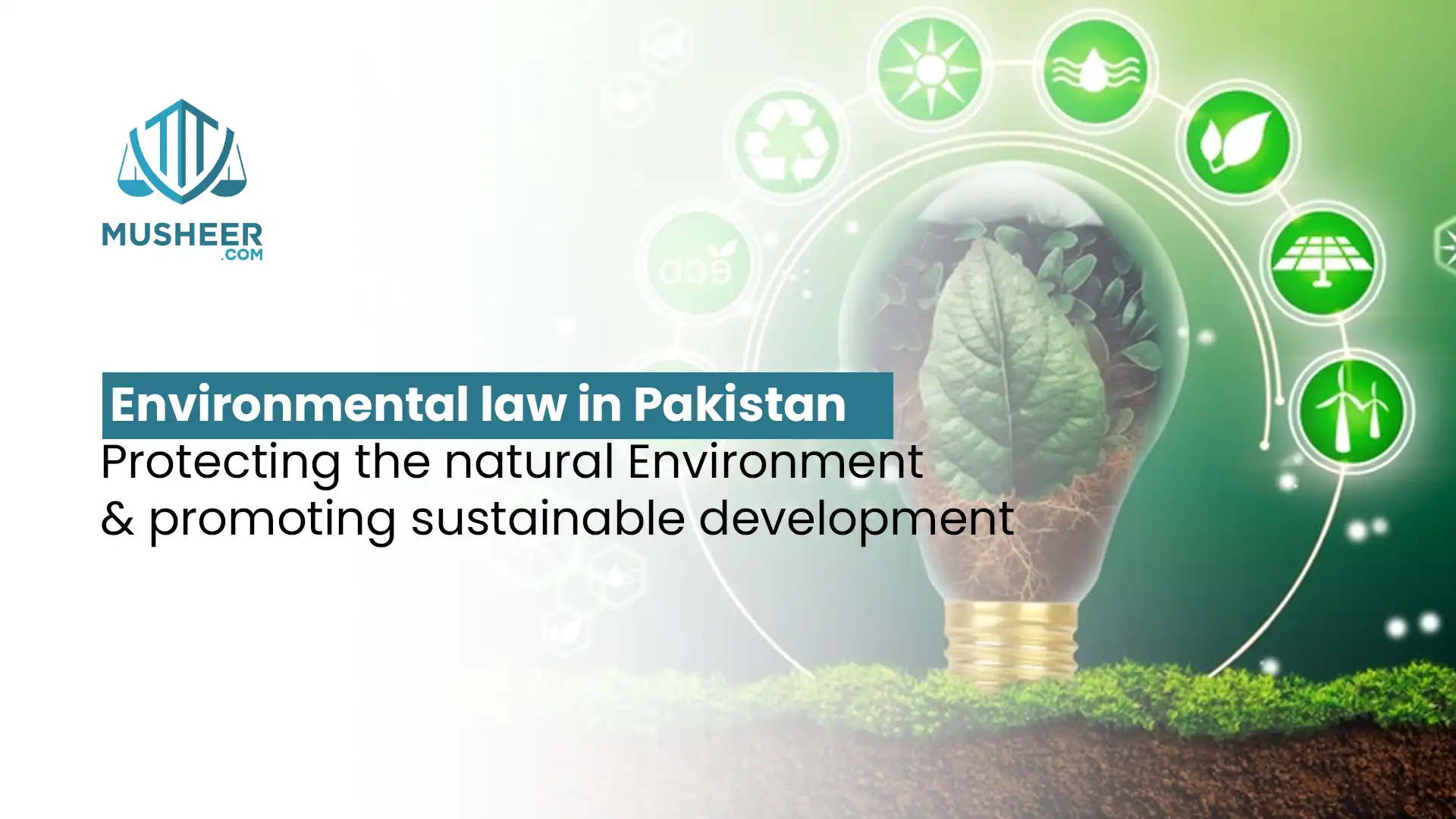Pakistan, like many other countries around the world, faces significant environmental challenges ranging from air and water pollution to deforestation and climate change. In response to these challenges, the government of Pakistan has implemented various environmental laws and regulations aimed at protecting the environment and promoting sustainable development.
Pakistan was one of the earlier countries in the Asia Pacific Region to promulgate, 1983, a national framework law on environmental protection, the Pakistan Environmental Protection Ordinance in 1983. However, due to population pressures, misallocation of resources, and a lack of enforcement framework for environmental laws, a vast majority of Pakistan's population continues to lack access to basic necessities such as clean water and air. Pakistan's cities are struggling to accommodate an influx of people from rural areas, which has created challenges in housing, transportation, healthcare, and waste disposal. The country's forest cover, which plays a crucial role in climate and soil protection, is in danger, and the Indus River system, which was once the backbone of British India's breadbasket, is threatened by salinity and waterlogging. Rivers and public waters have become polluted with untreated chemicals, and industrial and domestic wastes, endangering the food chain. One of the world's largest ecosystems, the mangroves, is under threat from land development and pollution. The country faces increasing desertification, and its wildlife heritage is in danger, despite some gains in some areas from schemes of trophy hunting supported by local communities. The country's growing energy needs are not adequately met, and its cultural heritage is neglected and inattentively cared for.
Pakistan Environmental Protection Act, 1997:
One of the key environmental laws in Pakistan is the Pakistan Environmental Protection Act of 1997 which superseded its predecessor legislation, the Pakistan Environmental Protection Ordinance in 1983. This law establishes the legal framework for the protection, conservation, rehabilitation, and improvement of the environment in Pakistan, coupled with the prevention and control of pollution and the promotion of sustainable development.
Its jurisdiction extends to the whole of Pakistan and its territorial waters, the Exclusive Economic Zone, and historic waters as well as to the Provincially Administrated Tribal Areas of the North West Frontier Province.
The Act provides for the establishment of the Pakistan Environmental Protection Agency (“EPA”), which is responsible for enforcing environmental regulations and policies at the federal level and four (4) Environmental Protection Agencies (the “Provincial EPAs”) at the provincial level to administer and implement the provisions of the Act.
Under the Act, the EPA has the authority to regulate and monitor activities that have the potential to cause environmental harm. This includes activities related to industrial production, transportation, and waste management. The EPA can issue permits and licenses for activities that are deemed to be environmentally safe and can take legal action against individuals or companies that violate environmental laws.
The Act prohibits a person, who proposes or intends to undertake a project (any activity, plan, scheme, proposal or undertaking involving any change in the environment and includes construction or use of buildings or other works; mineral prospecting, mining, quarrying, stone-crushing, drilling and the like; any change of land use or water use; and alteration, expansion, repair, decommissioning or abandonment of existing buildings or other works, roads or other transport systems, factories or other installations), to commence construction or operation unless he has filed with the concerned Provincial EPA, the IEE (a preliminary environmental review of the reasonably foreseeable qualitative and quantitative impacts on the environment of a proposed project to determine whether it is likely to cause an adverse environmental effect for requiring preparation of an environmental impact assessment) or the EIA (an environmental study comprising collection of data, prediction of qualitative and quantitative impacts, comparison of alternatives, evaluation of preventive, mitigatory and compensatory measures, formulation of environmental management and training plans and monitoring arrangements, and framing of recommendations).
The detailed procedure in this respect is provided in the Pakistan Environmental Protection Agency (Review of Initial Environmental Examination and Environmental Impact Assessment) Regulations, 2000.
The Act prohibits a) the import of hazardous waste into Pakistan; b) the generation, collection, consignment, transportation, treatment, disposal, storing, handling or importation of any hazardous substance except under a license issued by the Federal/Provincial EPA; c) the operation of a motor vehicle from which air pollutants or noise are being emitted in an amount, concentration or level which is in excess of the National Environmental Quality Standards.
The Act has the precautionary principle in its Environmental Protection Order (EPO), which can be issued by the Federal/Provincial EPA to deal with an actual or potential adverse environmental effect in violation of the provision of the Act.
Environmental Tribunals have also been constituted under the Act with exclusive jurisdiction to try serious offences and to hear appeals against the EPOs. Environmental Magistrates are also appointed under the Act to try minor offenses.
In addition to the Pakistan Environmental Protection Act, there are other laws and regulations that aim to protect specific aspects of the environment.
Forest Act, 1927:
This law regulates the management and conservation of forests in Pakistan, including the protection of wildlife and the prevention of deforestation. The Forest Act also provides for the establishment of forest reserves and the management of timber and non-timber forest products.
National Environment Quality Standards (Self Monitoring And Reporting By Industry) Rules, 2001 (The “NEQS Rules”)
The NEQS Rules obliges every industrial unit (any legal entity carrying on industrial activity) to submit an Environment Monitoring Report, with respect to priority parameters of liquid effluents and gaseous emissions, to the Federal EPA monthly, quarterly, or biannually depending upon the classification of the units into categories A, B, and C, respectively, by the Director General, Federal EPA. The Environment Monitoring Report shall comprise a Liquid Effluent Monitoring Report, a Gaseous Emissions Monitoring Report, and a Cover Sheet which shall be in the form as set out in Forms A, B, and C, respectively, to Schedule VI of the NEQS Rules.
Hazardous Substances Rules, 1999
The Pakistan Environmental Protection Act, 1997 prohibits the generation, collection, consignment, transportation, treatment, disposal, storing, handling, or importation of any hazardous substance except under a license (the “License”) issued by the Federal/Provincial EPA. The Hazardous Rules provide the list of substances prescribed as hazardous substances in Schedule 1. The Hazardous Rules further provides for the application, issue, conditions, validity, renewal, and cancellation of the License, and for the packing and labeling, premises, general safety precaution, safety precautions for workers, and import of the hazardous substances prescribed in Schedule 1 to the Hazardous Rules.
Despite the existence of these environmental laws and regulations, challenges remain in their effective implementation and enforcement. For example, there is often a lack of resources and capacity within government agencies responsible for enforcing environmental laws, leading to a gap between the law on paper and its implementation in practice. There is also a need for greater public awareness and participation in environmental issues, as well as a need for increased cooperation and coordination between government agencies, civil society organizations, and the private sector.
Environmental laws play a crucial role in protecting the natural environment and promoting sustainable development in Pakistan. While there are challenges to its effective implementation and enforcement, there is also great potential for progress in this area through increased public awareness and participation, greater capacity and resources for government agencies, and improved cooperation and coordination among all stakeholders. By working together, we can ensure a healthier and more sustainable future for Pakistan and its people.









